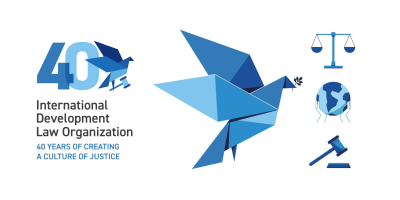

LETTER TO PARTNERS
December 2023
Dear friends,
As my first mandate as IDLO's Director-General comes to a close at the end of 2023, I wanted to share my thoughts on what has proven to be a remarkably eventful four years.
It has been a challenging period for the rule of law, justice, and human rights worldwide. We have experienced increasing conflicts, the severe impact of climate change, widespread food insecurity, escalating inequalities, and the lingering repercussions of the COVID-19 pandemic. The storm of crises has not only threatened peace and sustainable development, but has put decades of progress at risk.
Findings from the United Nations' 2023 Sustainable Development Goals Report show that we are significantly off track to achieve the targets set for the 2030 Agenda. In 2022, according to the World Justice Project, for the fifth consecutive year, most countries regressed in the rule of law. Since 2015, there has been a notable decline in government power constraints, anti-corruption measures, and fundamental rights.
We continue to witness massive violations of human rights and international humanitarian law across the world, with the gravest cases, as always, in conflict zones. Securing peace and protecting non-combatants is a critical test for the multilateral system and IDLO stands for the full respect of international humanitarian law and human rights, for everyone and in all circumstances.
Amid these global crises, IDLO's mission is more vital than ever. The rule of law is critical in responding to conflict, climate change, and food system emergencies, and provides solutions to some of the world’s greatest development challenges.
IDLO has made significant strides in promoting the catalytic role of the rule of law. We have adapted to evolving global circumstances, leveraging our extensive networks and partnerships of trust to address critical justice needs. Guided by the core principles of integration, inclusion, and innovation, our integrated approach to programming, research, and policy advocacy has positioned IDLO as a leading proponent for the rule of law and SDG 16.
I am pleased to share five major trends that have characterized IDLO’s trajectory over the past four years, which encapsulate both our achievements, as well as the challenges we faced.
ADVANCING PEOPLE-CENTRED JUSTICE IN INCREASINGLY FRAGILE AND COMPLEX ENVIRONMENTS
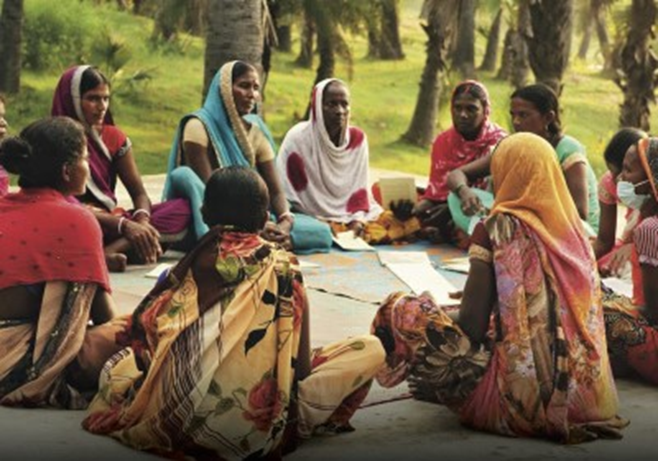
IDLO developed its current Strategic Plan in 2020, the year I started as Director-General, at a time of great disruption and a fast-changing external environment. It is based on the concept of ‘people-centred justice’ and guided by the understanding that people around the world use diverse pathways to seek redress for wrongs and to resolve their disputes.
IDLO’s approach prioritizes reforms that help close the justice gap and improve access, inclusion, and fairness in legal outcomes. This involves empowering justice seekers from the “bottom up”, and working from the “top down” to make laws and institutions more effective and responsive to people’s needs.
Amid rising conflicts and attacks on justice, more than half of IDLO's work now occurs in fragile settings where people are most in need of the protection of the law. Recognizing that development is not a linear process, I believe opportunities for positive change can exist in even the most difficult situations.
A good illustration is Afghanistan — IDLO’s largest country programme — which resumed operations in 2022 with the reopening of our Kabul Office. Despite narrowing public space and heightened scrutiny by the de facto authorities, IDLO has stayed engaged and continues to support justice seekers, especially women and vulnerable groups, through non-state service providers and community justice systems.
In the face of growing instability, IDLO has strengthened its support to civil society organizations and national human rights institutions with programmes in the Sahel, aimed at enhancing respect for human rights and public trust in the criminal justice systems in Burkina Faso, Mali, and Niger.
IDLO is supporting Ukraine’s efforts to promote accountability for international crimes, through continued support to the Office of the Prosecutor General and other partners, to enhance their institutional resilience and service delivery. We are expanding our cooperation on accountability for conflict-related sexual violence and crimes against children. IDLO has long supported anti-corruption efforts in Ukraine, including assistance for the establishment of the High Anti- Corruption Court and merit-based selection of prosecutors. We have continued work on these reforms during the conflict as they will be crucial for postconflict recovery.
Drawing on our experience in Ukraine, we facilitated the selection of anticorruption investigators and prosecutors in Armenia. Recently, we began assisting with an extraordinary vetting mechanism for prosecutors in Moldova, key to the country’s European Union accession negotiations. In Mongolia, IDLO aided in developing the National Anti-Corruption Programme. We also support the Financial Reporting Centre of Somalia, an important part of the government’s efforts to disrupt the financing of Al-Shabaab.
At the policy advocacy level, IDLO champions rule of law approaches to anticorruption in international forums including the Conference of the States Parties to the United Nations Convention against Corruption, the G20 Anti-Corruption Working Group, as well as meetings organized by UNODC and OECD.
In line with its people-centred approach, IDLO has a major focus on customary and informal justice systems which serve as the primary means of dispute resolution worldwide. In Somalia, for instance, IDLO has bolstered justice delivery through state and non-state institutions, including embedding female paralegals in Alternative Dispute Resolution Centres. These centres handled 7,000 cases in the past year, with nearly half brought by women.
Our work on customary and informal justice is a good illustration of IDLO’s integrated approach. Our research draws on insights and lessons learned from our work on the ground, which are then used in our policy advocacy at national, regional and global levels.
We launched two publications on this subject, "Diverse Pathways to People- Centred Justice" and “Women's Participation and Leadership in Customary and Informal Justice Systems" which offer evidence-based recommendations to enhance access to justice through customary and informal justice systems.
An increasingly important area of our work is at the intersection of justice, rights, and technology. IDLO promotes equitable digital innovation in the justice sector, particularly ensuring access for marginalized groups.
For instance, IDLO supported the improvement of the Electronic Case Management System in Honduras to make information more accessible to citizens through protocols, performance indicators, websites, and portals.
PROMOTING RULE OF LAW SOLUTIONS TO MAJOR DEVELOPMENT CHALLENGES
IDLO sees SDGs 16 and 5 as a prism through which the rule of law can help drive and accelerate progress across the entire 2030 Agenda.
We are focused on three priority areas where IDLO's expertise can make a significant impact: inclusive economic development; climate justice and the sustainable use of natural resources; and public health. This work, though a smaller part of our portfolio, has often been pioneering in promoting rule of law solutions to major development challenges.
IDLO has been committed to promoting inclusive economic development through the rule of law since its inception 40 years ago, helping countries to unlock their development potential.
For example, IDLO is supporting the Kenyan justice system, notably through the expansion of Court-Annexed Mediation and the development of small claims courts. These initiatives have dramatically reduced the time needed to resolve disputes, freeing up nearly USD 57 million previously tied in litigation.
During a recent mission to Kenya, I was able to see first-hand the impact of this work in reducing case backlogs and building trust in communities.
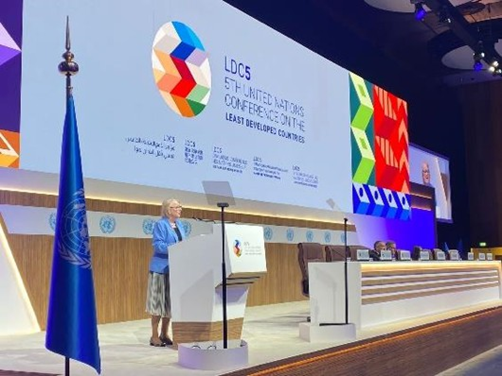
Support for Least Developed Countries (LDCs) is essential if we are to fulfil the 2030 Agenda’s promise to “leave no one behind”. IDLO’s Investment Support Programme for Least Developed Countries provides no cost, on demand assistance to LDCs to attract, negotiate, and manage international investments.
This public/private partnership, which was referred to in the Doha Programme of Action, provided investment-related assistance to Mauritania, Rwanda, Senegal, and Somalia in 2023.
In March, I led IDLO’s delegation to the Fifth United Nations Conference for the Least Developed Countries in Doha, highlighting the importance of the rule of law in fostering sustainable development in LDCs, including by contributing to an attractive business climate, making development more inclusive, and combating climate change and environmental degradation.
Over the past three years, we have developed and scaled up our work on climate justice. In light of the innovative nature of this work, IDLO has produced a significant portfolio of publications, to emphasize how rule of lawbased approaches can accelerate climate action.
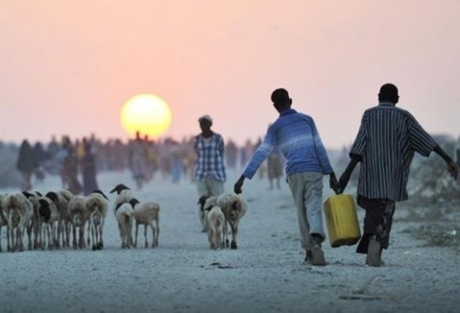
A good example is our recent publication on “Rule of Law Responses to Climate Insecurity" which draws on case studies from Burundi, Indonesia, Rwanda, and Somalia, to demonstrate how people-centred justice interventions can respond to risks of insecurity and conflict exacerbated by climate change.
IDLO continued its advocacy on climate justice through participation in multilateral dialogues and other global events.
I led IDLO’s delegation to COP26 in Glasgow and COP27 in Sharm el-Sheikh, where we aimed to highlight the interlinkages between the rule of law, human rights, gender equality, and climate action and to keep “climate justice” high on the agenda. We continued this engagement at COP28 in Dubai. IDLO also participated in the UN Biodiversity Conference (COP15) in Montreal, emphasizing the catalytic role of rule of law approaches in implementing the Kunming-Montreal Global Biodiversity Framework.
We increasingly focus on the critical link between gender equality and climate action, championing a feminist approach to climate justice. In recognition of these efforts, the Generation Equality Action Coalition on Feminist Action for Climate Justice (FACJ) has invited IDLO to become a Coalition Leader, making IDLO the first commitment maker asked to assume a leadership role.
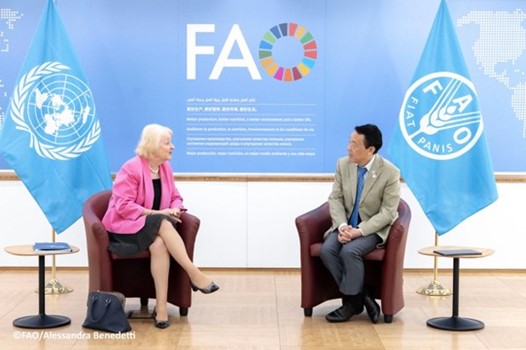
IDLO remains committed to promoting rule of law approaches to food systems transformation. Insights from a project on “Food Security and the Rule of Law in Time of Emergencies”, implemented in partnership with FAO in Honduras and Uganda, will be shared in an upcoming joint publication.
Our policy brief on “Rule of Law for Food Systems Transformation" provides crucial recommendations for integrating rule of law mechanisms into food systems.
We are also enhancing our engagement with global food platforms. The United Nations Food Systems Summit and pre-Summit meetings were important opportunities to highlight the link between the rule of law and inclusive and sustainable food systems transformation.
This year, we participated in the UNFSS+2 Stocktaking Moment, and I met with the Director-General of FAO to explore future collaboration. IDLO took part in the FAO Conference for the first time in 2023 and joined the Committee on World Food Security as an observer. IDLO also participated in the second Arab Forum on “Equality: One Voice, Quality in Food Security” in Beirut, and in the “Climate Security and Migration in the Mediterranean” event, organized by CGIAR.
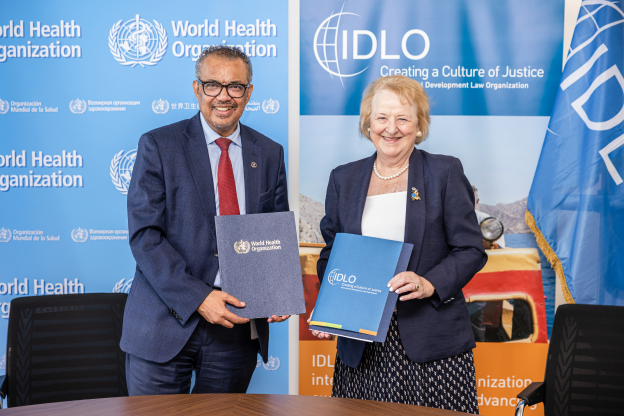
IDLO works at the nexus of health, sustainable development, and the rule of law to promote the right to health. Following the COVID-19 pandemic, our work on a Pandemic Preparedness and Response project with WHO focused on strengthening legal frameworks to manage health emergencies.
Our Global RECAP Programme promotes healthier lifestyles as a preventive measure against non-communicable diseases, with ongoing activities in Bangladesh, Kenya, Tanzania, and Uganda. Our MOU with WHO, observer status at the World Health Assembly and membership in the Global Health Security Agenda Legal Preparedness Action Package are enabling us to be more engaged with global policy-setting. We also participate in meetings of the UNAIDS Programme Coordinating Board.
REDUCING THE JUSTICE GAP FOR WOMEN AND GIRLS
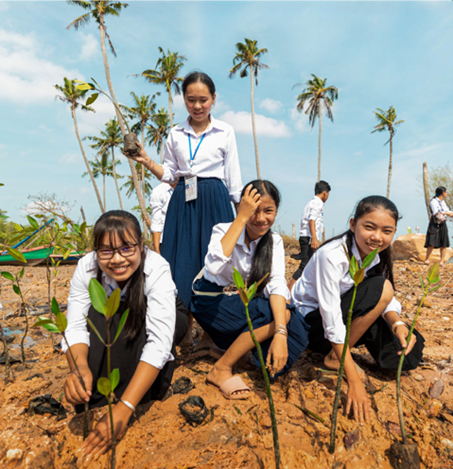
As an International Gender Champion, I am fully committed to closing the gender justice gap. IDLO integrates gender equality throughout its work, complementing gender mainstreaming with focused interventions to address key justice challenges faced by women and girls.
In partnership with UN Women, and other partners, we promote equality both in law and in practice by supporting the repeal or reform of discriminatory laws and policies, and the implementation of gender equality provisions within national legal frameworks.
For example, IDLO has conducted comprehensive assessments in Kenya, Mali, the Philippines, and Sierra Leone, to identify and tackle discriminatory laws and practices. These interventions have been backed by multi-stakeholder dialogue and capacity building to facilitate legal reform.
We also promote survivor-centric approaches to combat gender-based violence (GBV), work that is crucial in response to the rise in GBV during the COVID-19 pandemic and in conflict situations.
IDLO has adapted its programming to meet the increased demand for support and services for GBV survivors. This has included rapid reaction initiatives, such as supporting one-stop service centres and shelters in Mongolia and assisting a legal aid hotline for GBV survivors in Tunisia.
In Kenya, IDLO supported the establishment of specialized Sexual and Gender- Based Violence (SGBV) Courts. In Mongolia, IDLO piloted mobile GBV clinics, providing over 1,200 survivors with primary legal advice, psychological counseling, and referral services.
We recently launched a research study on Survivor-centred Justice for GBV in Complex Situations, developed in partnership with George Washington University. It includes case studies from Afghanistan, Honduras, Papua New Guinea, the Philippines, South Sudan, and Tunisia and provides perspectives on the complexity of accessing justice and addressing GBV in situations involving conflict, organized crime, climate disasters, and health emergencies.
IDLO promotes the active participation and leadership of women professionals in all parts of the justice sector. In 2023, in Afghanistan, IDLO conducted sessions on women’s labour rights, bringing together women jurists, professors, and traditional leaders. The discussions are a unique platform for Afghan women to exchange best practices and empower each other. IDLO remains committed to nurturing this potential in Afghanistan and beyond, and continues to support women’s organizations and advocates to the extent possible.
An initiative to enhance the professional expertise of women working in the law enforcement sector in Liberia includes capacity development for a range of female law enforcement officers working in non-traditional areas.
We also partner with the International Association of Women Judges, including co-organizing their 17th Africa Region Conference in Uganda, as part of East Africa Justice Week.
IDLO continues to highlight the fundamental importance of justice for women and girls through our participation in policy forums, including the Commission on the Status of Women, the Women Deliver Conference in Kigali, and the Generation Equality initiative.
INVESTING IN OUR PEOPLE AND SYSTEMS
The COVID-19 pandemic presented unprecedented challenges, requiring rapid adaptation and resilience, propelling IDLO to critically assess and strengthen its operational framework.
IDLO has adopted a more integrated approach to programme development. We are also taking steps to systematically include a Human Rights Based Approach and to develop context-specific country strategies.
A significant part of the transformation involved enhancing IDLO's resultsbased management system. A Strategic Results and Resources Framework has been developed to translate the organization’s strategic objectives into tangible development and organizational results.
This framework marked IDLO’s first attempt at implementing a quantitative results monitoring system to strengthen the organization’s focus on outcomes and its internal monitoring capacity. This was complemented by the formation of cross-departmental thematic clusters, designed to foster thematic focus, and enhance collaboration across the organization.
As a specialized knowledge-based organization, our staff is IDLO’s most important resource. Since I became Director-General, we have looked closely at IDLO’s human resource systems.
I am pleased to report that women now constitute 50% of the Senior Leadership Team compared to 20% in 2020. I have also introduced a systematic change management process to strengthen the management culture and enhance staff engagement across the organization.
Investments in internal learning and development programmes have been prioritized, aimed at bolstering staff capacity and professional growth. Recognizing the challenges posed by operating in high-stress environments, IDLO promotes mental health and wellness in the workplace.
My foremost priority is ensuring our staff’s safety and well-being, especially in high-risk areas like Afghanistan, the Sahel, Somalia, and Ukraine. Efforts to secure legal recognition as an intergovernmental organization in all countries of operation continue, with progress in signing Host Country Agreements with the Bahamas, the Democratic Republic of the Congo, and Ukraine, and IDLO is in negotiations with several other countries.
Diversification of IDLO’s funding sources remains a critical goal, especially increasing core contributions which are essential to making crucial investments in our staff and systems. Despite raising the core-to-non-core funding ratio in 2023, reliance on a limited group of partners for funding persists. I am very grateful to our major donors who have been dedicated, long-term supporters of the organization. I would ask others to consider contributing to our important work.
EXPANDING PARTNERSHIPS TO MOBILIZE POLITICAL AND FINANCIAL SUPPORT FOR THE RULE OF LAW
I consider partnerships to be key to IDLO’s success. We recognize the critical importance of expanding partnerships as a strategic means to mobilize political and financial support for the rule of law, and that complex global challenges require collaborative solutions. IDLO actively seeks to broaden its network of partners, encompassing a wide range of stakeholders including governments, the United Nations system and other international organizations, civil society, the private sector, academia, judiciaries, youth, and more.
We have built new partnerships and deepened existing ones. I have engaged extensively with Member Parties in capitals, as well as in Rome, Geneva, and New York.
In 2023, IDLO continued to expand its membership, with Niger becoming our 38th Member Party. Discussions are ongoing with several more States to promote a balanced growth in IDLO’s membership.
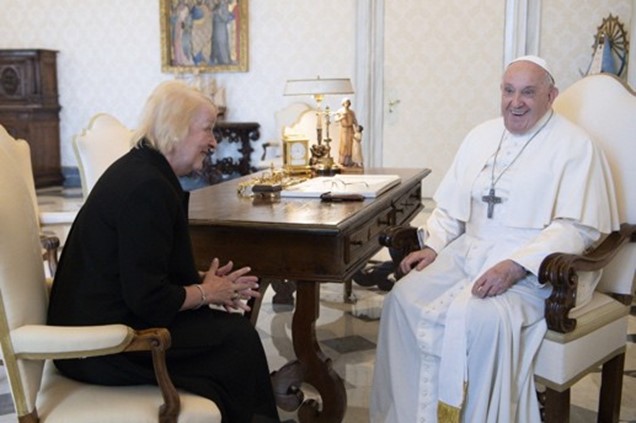
I was honoured to have a private audience with His Holiness Pope Francis in September. We discussed our shared commitment to advancing justice, the rule of law, gender equality, and supporting the most vulnerable.
Since securing the pillar assessment in 2022, we have been actively strengthening our partnership with the European Union.
IDLO has also deepened its cooperation with organizations of the UN system. This engagement, ranging from collaborative programming and research to policy advocacy, reflects a shared commitment to advancing the rule of law and justice worldwide. In addition to its outreach to FAO, WFP and IFAD on food security and nutrition, IDLO has also deepened its engagement with other Rome-Based Agencies including UNIDROIT and ICCROM.
We have also sought to keep the rule of law high on the international agenda through our policy advocacy, leveraging our presence in New York, Geneva, The Hague and Rome, and in all regions of the world.
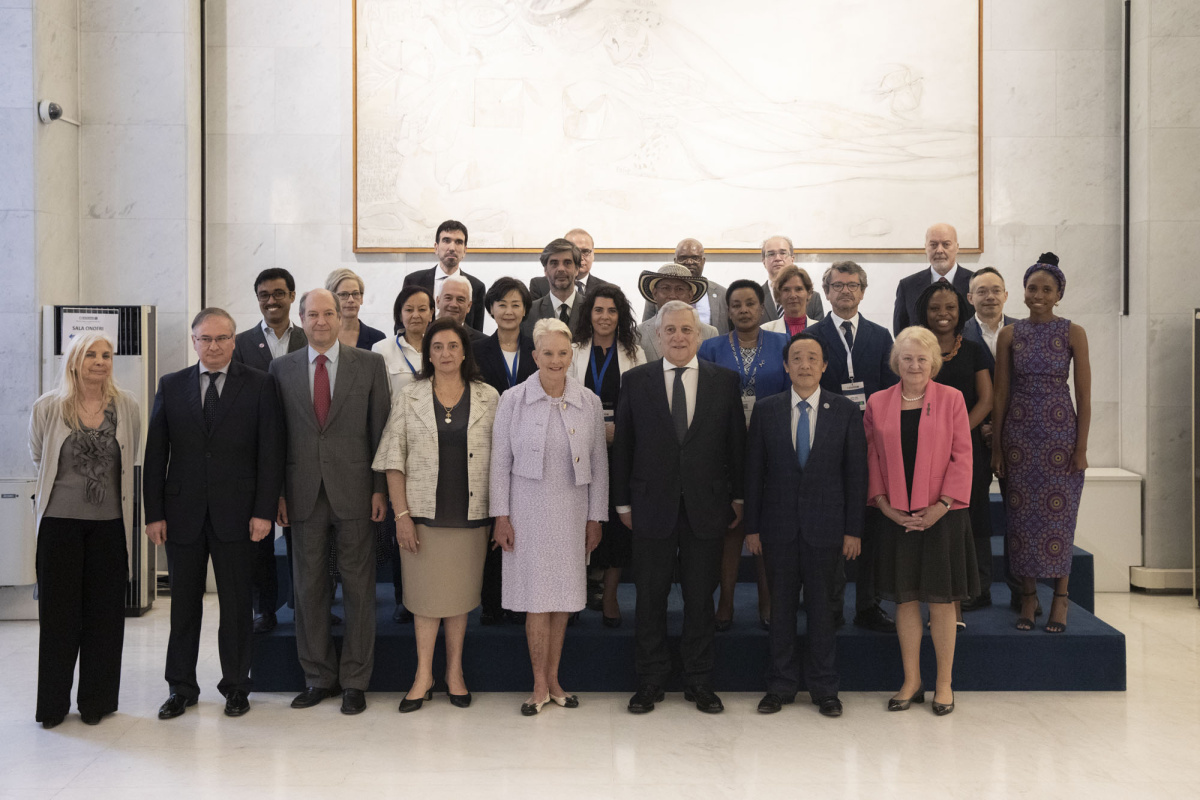
Our flagship policy advocacy event, the SDG 16 Conference co-hosted in Rome with the Government of Italy and UN DESA, has become an important forum for multistakeholder dialogue. This year’s meeting, which attracted high-level participation, highlighted the critical role of the of law in responding to intersecting crises.
The key messages of the Conference were, at the request of Italy, circulated by the Secretary-General to all UN Member States as a joint General Assembly and ECOSOC document, and helped to inform the High-Level Political Forum and the SDG Summit.
We have also provided submissions to several multilateral processes and delivered statements at the consultations, including the Political Declaration for the SDG Summit; the New Agenda for Peace; the Declaration on Future Generations; the Global Digital Compact; and the High-Level Meeting on Pandemic Prevention, Preparedness and Response.
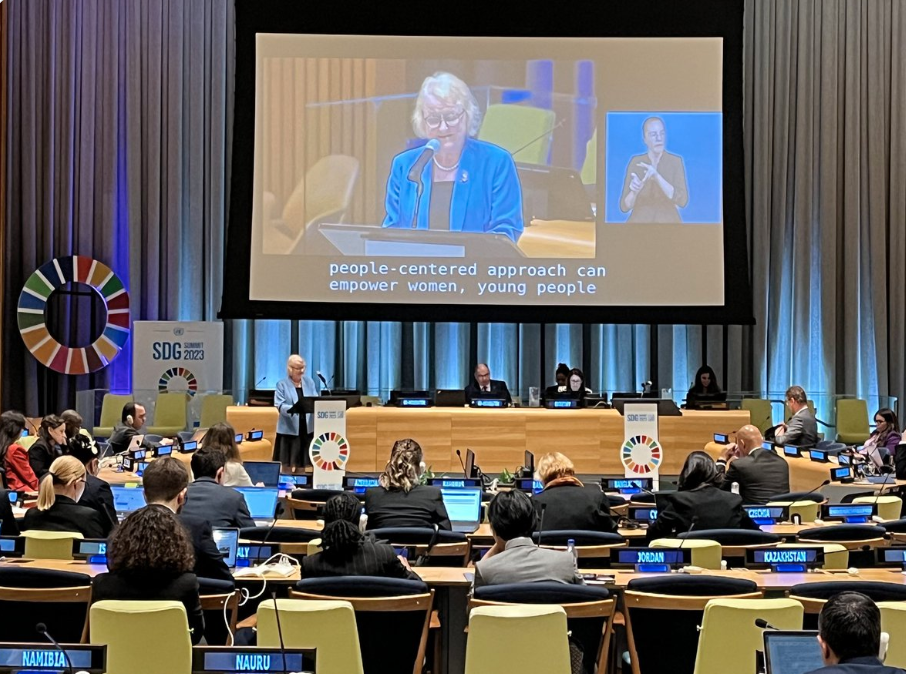
In May, I was invited by the President of ECOSOC to deliver the opening remarks at a special meeting she organized focusing on "Harnessing the Game-Changing Potential of SDG16”. During High-Level Week at the UN General Assembly this year, I advocated for the rule of law and access to justice, and addressed the Leadership Dialogue on “Strengthening integrated policies and public institutions for achieving the SDGs”.
In October, I met with the incoming Presidents of the General Assembly and ECOSOC.
IDLO deepened its engagement with the Human Rights Council and the international community in Geneva. I represented IDLO at the High-Level Opening of the 52nd Session of the Human Rights Council and IDLO has been an active participant in the sessions of the Council throughout the year.
This year also marks the 10th anniversary of the establishment of IDLO's Offices in Geneva and The Hague. We marked the occasion with a series of events to promote IDLO, its mandate, and its partnerships.
IDLO also contributed expertise and gained insights from participation in various global networks and forums, such as the Justice Action Coalition, the World Bank’s Justice and Rule of Law Partner Network, the Summit for Democracy, and the Team Europe Democracy Initiative.
I participated in the Tashkent Law Spring, alongside Ministers from Azerbaijan, Kyrgyzstan, Uzbekistan, and Singapore, as well as other global leaders. In my remarks, I emphasized the critical importance of ensuring that the rule of law and access to justice are available to all to promote peace and sustainable development in the region.
LOOKING AHEAD
This year, as we mark the 40th anniversary of the establishment of IDLO, we celebrate the many accomplishments of the organization and the strong partnerships in support of justice and the rule of law that we have been able to build.
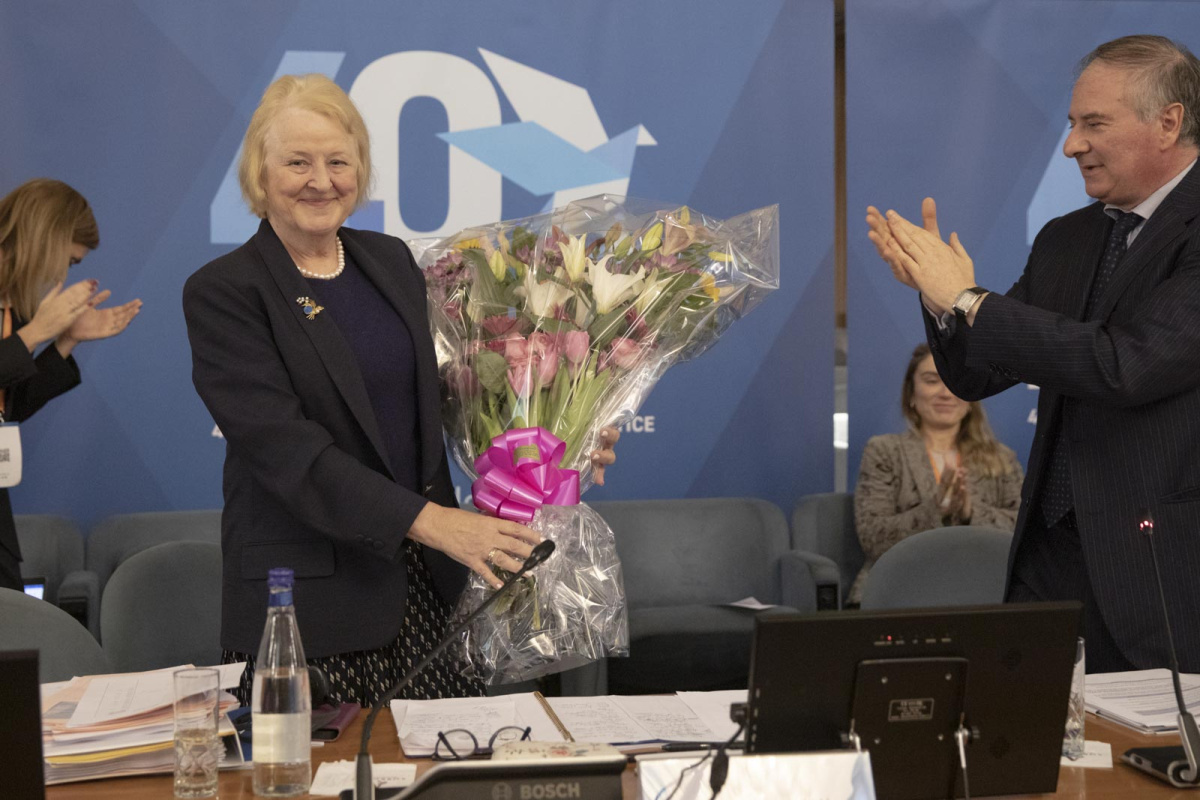
I am deeply honoured to have been re-elected unanimously for a second four- year term during the November Assembly of Parties. I extend my gratitude to our dedicated Member Parties, partners, and IDLO colleagues across the globe.
At the same time, the challenges we all continue to face are too complex and daunting to leave any room for complacency and IDLO is determined to do its part. We need to leverage our four decades of experience in over 90 countries, our trusted networks, our multistakeholder convening power, and our thought leadership on SDG16 and the rule of law in its broadest sense.
We must continue to increase global awareness of the linkages between the rule of law, human rights, peace and sustainable development.
As IDLO's current Strategic Plan comes to an end in 2024, we will be developing a new plan for the next strategic cycle, focusing on leveraging our comparative advantage, enhancing partnerships, contributing towards sustainable peace and accelerating progress on the 2030 Agenda. We will continue to explore rule of law solutions to global challenges from achieving gender equality, to addressing climate change, and ensuring the responsible use of frontier technologies, such as Artificial Intelligence.
Success will depend on further investment in our people and systems which will require sustained political will and increased financial support. Real change is possible when we collaborate across sectors, across societies, and across the world.
I look forward to working with you all to build a more peaceful, just, and sustainable future.
Warm regards,

